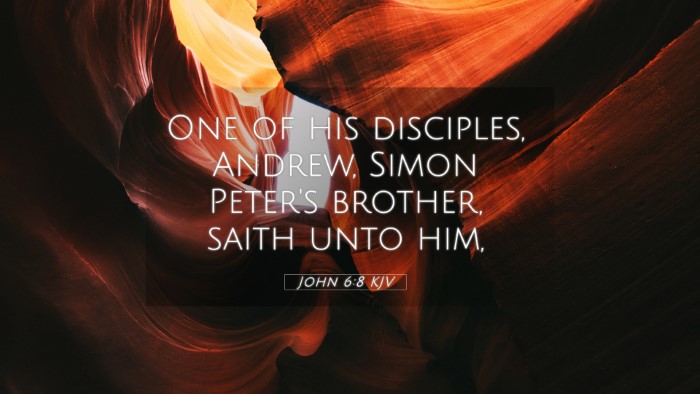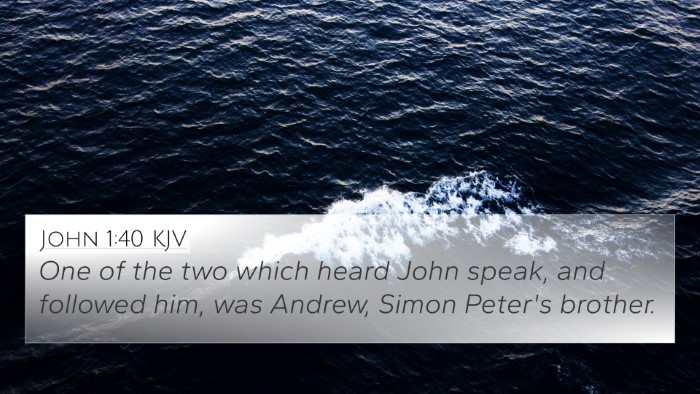Understanding John 6:8
Verse Context: In John 6:8, we see an important moment in the narrative of Jesus's ministry, where He feeds the multitude. This verse introduces a conversation about resources in the face of great need, showcasing both human limitations and divine possibilities.
Interpretation and Insights from Commentaries
Matthew Henry's Commentary: Matthew Henry emphasizes the importance of recognizing our resources and limitations. The verse reflects the initial skepticism about the available resources (a boy's lunch) compared to the vast need. Henry notes that this serves as a prelude to a miracle, illustrating how God can work through seemingly inadequate means to achieve His purposes.
Albert Barnes' Commentary: Barnes highlights the personal aspect of this verse as it features the actions of an individual (the boy with the loaves), showing that even small contributions can play a vital role in God's plan. He draws parallels to how God often uses individuals’ efforts to accomplish great tasks, reinforcing the idea that every act of faith matters, no matter how small it may seem.
Adam Clarke's Commentary: Clarke provides a broader perspective on the response to the immediate needs of the people. He discusses the significance of the dialogue that precedes the miracle, which sets the stage for understanding faith in action, and dependence on divine providence when faced with needs greater than our capacity to fulfill them.
Related Bible Verses and Cross-References
- Matthew 14:17: The disciples express their concern about feeding the crowds, illustrating a theme of human limitation.
- John 6:9: Directly follows John 6:8, describing the boy who offers his loaves, showcasing generosity in the face of scarcity.
- Mark 6:38: Similar to the account in John, emphasizing the need for assessment of available resources.
- Philippians 4:19: Paul reassures believers that God provides for all needs, resonating with the theme of divine provision.
- 2 Corinthians 9:8: Explains God's ability to provide abundantly for all needs and good works, echoing the message of reliance on Him.
- Exodus 16:15: The story of manna in the wilderness demonstrates God's direct provision for His people when they face scarcity.
- 1 Kings 17:12-16: The widow of Zarephath provides food for Elijah, paralleling the theme of faith and divine provision from little resources.
Connections Between Bible Verses
John 6:8 can be understood within the larger context of biblical themes such as faith, provision, and the power of God working through ordinary means. This verse encourages believers to consider how their small acts of faith contribute to the larger narrative of God's work in the world.
Thematic Bible Verse Connections
The themes illustrated in John 6:8 resonate with numerous other passages throughout both the Old and New Testaments, focusing on:
- Divine Provision: How God meets the needs of His people, as seen in Exodus and 1 Kings.
- Faith in Action: The requirement of individuals to act, contributing to God's work, similar to the examples in the New Testament.
- Community Needs: Responses to collective needs, highlighting the communal aspect of faith, seen throughout the Gospels.
Exploration of Cross-Referencing Biblical Texts
To understand the relationships within Scripture, tools for Bible cross-referencing such as a concordance or cross-reference guide can aid in identifying connections and themes. Using these tools, you can delve deeper into the text, finding cross-references for John 6:8, enhancing your study and understanding of related verses.
Conclusion
In conclusion, John 6:8 serves as a powerful reminder of the small contributions and faith-filled actions of individuals within the greater narrative of God's provision and miracles. By examining its connections and cross-references, one can appreciate the rich tapestry of insights and teachings contained within the Bible.




